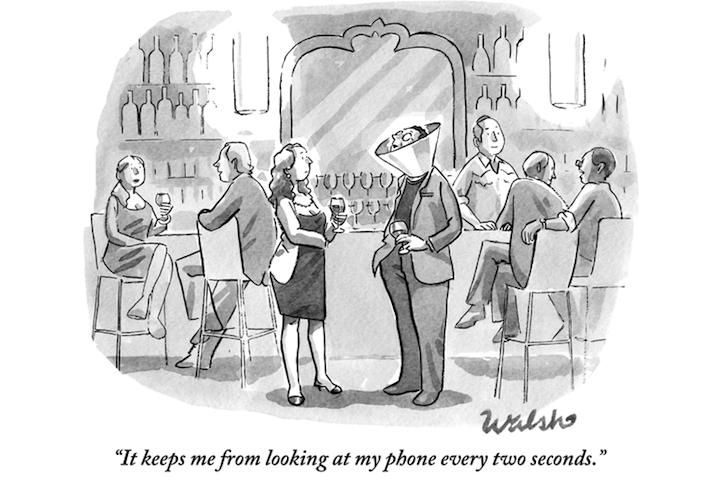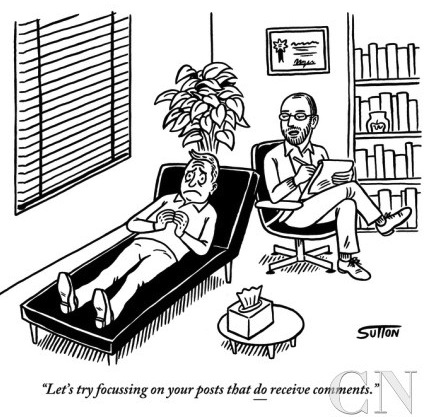
God bless Portlandia. Their first season contained a skit that has proven to be more than a little prophetic. In case you missed it (ICYMI):
On the surface, Fred and Carrie are emphasizing how people compete over being well informed, how prideful our relationship with information has become. They’re lampooning a world where ‘staying on top of things’ has become an increasingly treasured form of righteousness, where the mastery of information–for certain personality types–is as tantalizing as it is illusive.
One expression of this pursuit is the barrage of links we receive and share with others over social media. Taken individually, such ‘favorites’ are mostly just enthusiastic recommendations. Taken as a whole, though (and I’m including outlets such as our own), the subtext is getting hard to ignore. It’s impossible to stay ‘caught up’. And it’s not even clear why doing so is important, only that it is. This is part of what Nick Mickowski sent up in a priceless bit for McSweeney’s a couple years ago, i.e. how theoretical this mastery of information is, “I’m All Caught Up!”:
Guys, I did it. I did it! I’m caught up! I experienced every show, movie, webisode, album, book, webcomic, podcast, video game, Twitter feed, Tumblr, Instagram, Reddit AMA, and op-ed you guys were telling me I had to check out. Now we can talk about them and I won’t feel like such an outcast when we hang out. So let’s get to it. What do you want to talk about?
Clever stuff. Anyone who spent the break cleaning up their inbox or delving into their backlog of media can corroborate. The mountain top does not exist. Nor do relationships tend to benefit from the added expectations represented by all the required reading. Now, before you cry “first world problem!” (awful phrase), Portlandia goes further. In their skit, aspiring to comprehensiveness is not a neutral drive. It can be destructive, maybe even fatal. The law–you must be on top of things–keeps Fred and Carrie squarely focused on themselves, breeding first antagonism and, then, death.
That was waaaay back in 2011. Few would argue that the pace hasn’t picked up considerably since then. As the attempt to manage the flood of information has turned more frantic, the different responses have become more pronounced: some give up (Twitter’s numbers are down for the first time ever) and stop expecting anyone else to be on top of things either. These are wise people. Others, let’s call them “suckers”, redouble their efforts (start an Instagram account for instance). Others respond by writing thoughtful, tweetable, must-read columns about the glut of thoughtful, tweetable, must-read columns. Ahem.
My favorite of these columns would have to be the one Elizabeth Minkel penned for The New Statesman somewhat recently (we missed it!) about the “online acronym that is destroying my soul”. That’s right, she’s referring to ICMYI. Get a load of this:
I’ve lost track of the number of times I’ve seen someone apologize for sharing something “old” that was published 48 hours prior. I’ve lost track of the number of times I’ve seen something interesting and completely un-timely and thought about sharing it, only to stop myself when I noticed it had been published a year or two ago. And I’ve lost track of the number of times when I’ve seen a piece – or, for that matter, written a piece – that seems to fall flat because it came out a week or two after the bulk of an internet maelstrom. “In Case You Missed It” makes the feeling explicit. It’s hard for a lot of us to fight the compulsion to stay up-to-the-minute – in reality, it’s impossible, but it somehow seems achievable. ICYMI makes staying connected feel like a constant game of catch-up, like finding things at a slower pace warrants some kind of disclaimer…
ICYMI is a tacit acknowledgement of that psychological finish line, always being moved an inch more out of reach – I can feel it now, chipping away at me.
When people complain about the way things are online, how they feel overwhelmed, or how each digital interaction leaves them feeling just a tiny bit more hollow, I can’t help but think: ‘This can’t possibly be sustainable.’
Now if that’s not a memorable description life under the law, which St Paul rightly calls “a curse” (Galatians 3:10), I don’t know what is. After all, the only thing sustainable about life under the law is its unsustainability.
Of course, the information itself isn’t the problem, it’s the accompanying imperative about staying abreast of it all, which is fed, clearly, by the need to master, to prove ourselves, to justify. It’s certainly compounded by our increasing bias toward the new (which Ethan has discussed so insightfully, ICYMI), not to mention the technology which makes indulging so easy. The most viral Facebook post is the one that hasn’t been posted yet.

But that’s not all. There seems to be a growing consensus that the acceleration of information is having an adverse effect, not just blood pressure-wise but on the information itself. Cue Leon Wieseltier, who described the production side of the equation (as opposed to Fred and Carrie who dealt with consumption – admittedly the lines are blurring) for The New Times Book Review. We put it in Friday’s weekender, ICYMI. Must-read, folks:
Journalistic institutions slowly transform themselves into silent sweatshops in which words cannot wait for thoughts, and first responses are promoted into best responses, and patience is a professional liability. As the frequency of expression grows, the force of expression diminishes: Digital expectations of alacrity and terseness confer the highest prestige upon the twittering cacophony of one-liners and promotional announcements. It was always the case that all things must pass, but this is ridiculous.
He’s describing a cycle I/we know all too well, one that’s almost impossible not to get caught up in. Not if you actually want to communicate, or if you care about your message. The upside of our predicament is the unprecedented opportunity–and contrary to what Wieseltier might have us believe, the democratization of the Net has produced some wonderful voices. (For all its disadvantages, the rate of expression does turn people into better writers. It can’t not.) The downside is the cheapening that occurs when, in order to take advantage of that opportunity, you have to sensationalize and/or reduce your message. It’s a forgone conclusion that the emphasis would fall less and less on what is being said and more on that it’s being said.
On a macro level, it’s a fairly dis-spiriting vista, and Lord knows we’re not above it. (I for one feel pretty conflicted about engaging in what feels more and more like a game.) Lest we make it sound like this is being thrust on us, it isn’t. This is the culture we’ve created, the one we can’t stop perpetuating. Frequency and volume are a lot easier to control than substance/quality, and if our anthropology tells us anything, it’s that control is a universal addiction (and always has been). The only way to explain our crazy-making relationship with information these days is that scratches some kind of internal itch. Better that than other things? I don’t know.
A dark post, I know, but hopefully not lacking in compassion. I’m thinking particularly of Teddy Wayne, who took up the subject of ICYMI in a terrific recent column for The NY Times, appropriately titled “The Unending Anxiety of an ICYMI World”. The section that stuck out most was:
The very shortening of the phrase is a byproduct and acknowledgment of the velocity of information against which its attached link is racing. The implication is that you probably have not seen it, and it’s not necessary to your existence, but the sender would like to bring it to your attention anyway, please. It serves as a call of desperation as much as an announcement: Can you hear my whisper in these howling winds?
If what Wayne writes is true, and based on my own experience/heart I believe it is, then the flood of new information is neither new nor strictly information. It is a gazillion voices saying the same thing, over and over: acknowledge me = read me = agree with me = affirm me = love me. This is the age-old cry of the human heart, a cacophony not of information or opinion but of need.
In that light, when we put our ear to the deafening noise, perhaps we are catching a snippet of divine perspective, a glimpse at what God must hear when listening to his children–to you and to me. And if so, then the only message that bears equal repetition, day after day, hour after hour, is the foolish insistence that our cries do not go unheard. That they are answered, not by more information but by the still, small voice of a living God, one whose love is as bottomless as our need for it.
It’s true. The man upstairs doesn’t ‘miss’ a thing.

COMMENTS
3 responses to “On Playing Catch Up (In Case You Missed It)”
Leave a Reply














My favorite part of this is the “Share This” line at the bottom. And of course I did so that I could fully immerse myself in the Irony.
I heard the other day on the radio that for every one second of life lived, there are two hours of data produced on the internet. (I’m trying to google that stat and having no success, so maybe I’m making this up.) Though if so, it’s not just practically impossible to keep up with everything, it’s theoretically impossible too. Just impossible not to miss most things, 99% of things.